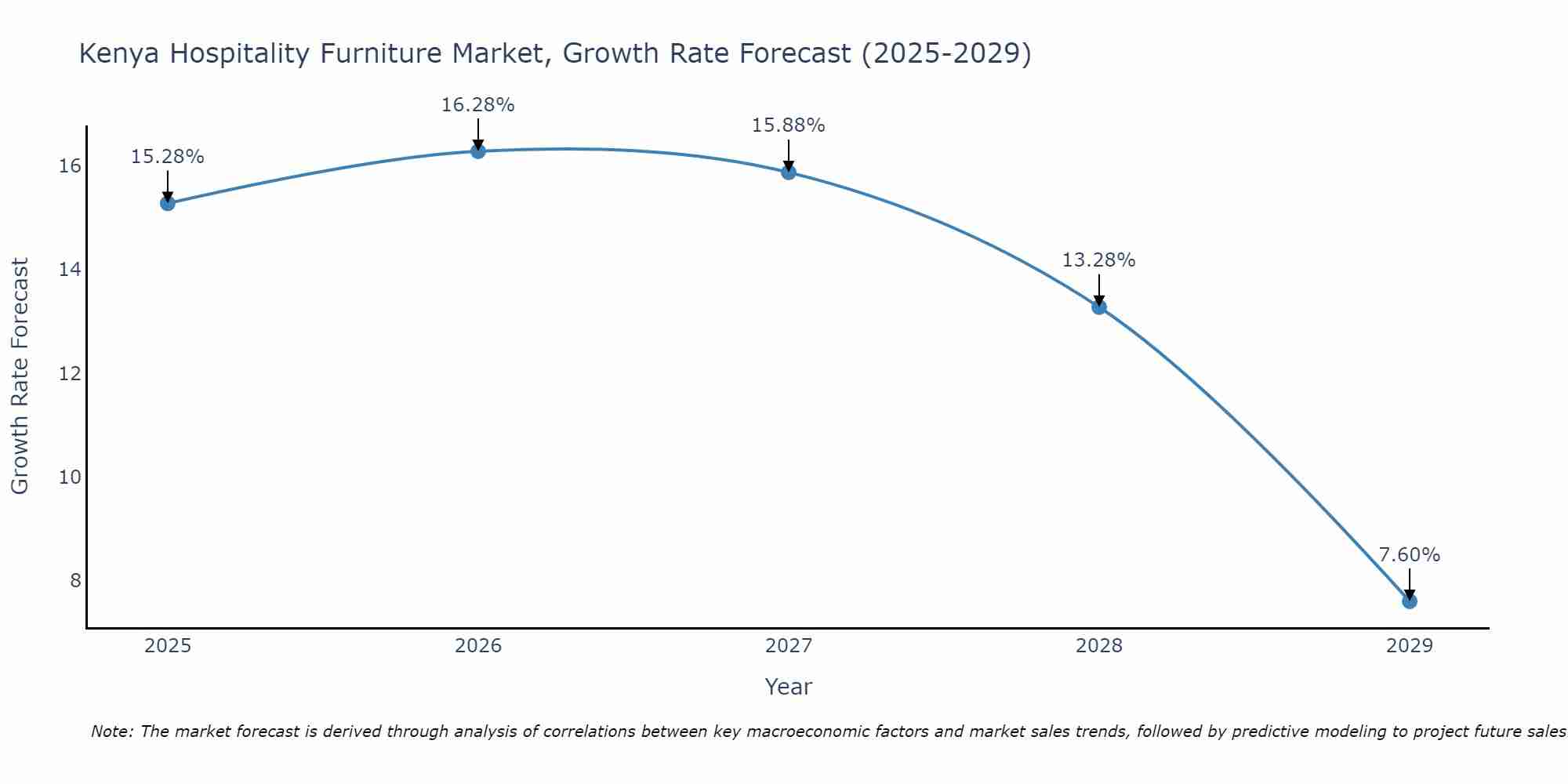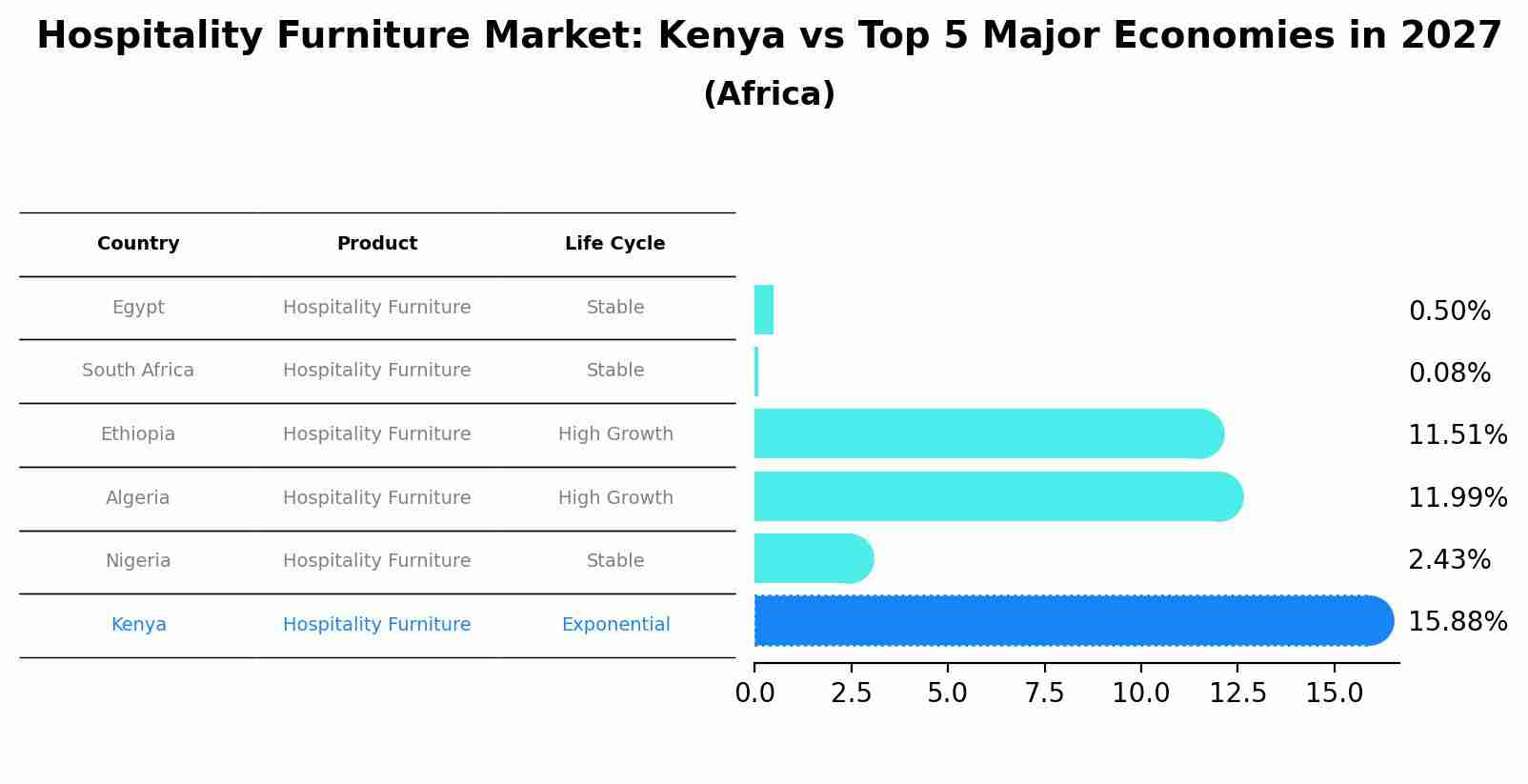Kenya Hospitality Furniture Market Outlook | Size, Value, Analysis, Revenue, Forecast, Share, Companies, Growth, Trends, COVID-19 IMPACT & Industry
| Product Code: ETC371930 | Publication Date: Aug 2022 | Updated Date: Jul 2025 | Product Type: Market Research Report | |
| Publisher: 6Wresearch | Author: Vasudha | No. of Pages: 75 | No. of Figures: 35 | No. of Tables: 20 |
Kenya Hospitality Furniture Market Size Growth Rate
The Kenya Hospitality Furniture Market is projected to witness mixed growth rate patterns during 2025 to 2029. The growth rate begins at 15.28% in 2025, climbs to a high of 16.28% in 2026, and moderates to 7.60% by 2029.

Hospitality Furniture Market: Kenya vs Top 5 Major Economies in 2027 (Africa)
By 2027, Kenya's Hospitality Furniture market is forecasted to achieve a exponential growth rate of 15.88%, with Egypt leading the Africa region, followed by South Africa, Ethiopia, Algeria and Nigeria.

Kenya Hospitality Furniture Market Synopsis
The Kenya hospitality furniture market is witnessing steady growth driven by increasing tourism and hospitality sector investments in the country. With a focus on providing comfortable and aesthetically pleasing furnishings for hotels, resorts, restaurants, and other hospitality establishments, the market offers a range of products including beds, sofas, chairs, tables, and other decor items. Local manufacturers and international brands compete in this market, offering a variety of styles and designs to cater to the diverse needs of the hospitality industry. Sustainable and eco-friendly furniture options are also gaining popularity as businesses strive to align with global sustainability trends. The market is expected to continue expanding as Kenya`s tourism sector grows, creating opportunities for both local and international furniture suppliers to establish a strong presence in the market.
Kenya Hospitality Furniture Market Trends
The Kenya Hospitality Furniture Market is experiencing a growing demand for eco-friendly and sustainable furniture pieces, driven by increasing awareness of environmental issues among consumers. Hotels, resorts, and restaurants are increasingly opting for furniture made from recycled materials, reclaimed wood, and sustainable resources to align with their environmentally conscious image. Additionally, there is a trend towards incorporating locally made furniture to showcase Kenyan craftsmanship and promote the local economy. Design-wise, there is a preference for modern and minimalist styles that offer a sleek and sophisticated look while maintaining functionality and comfort. Customization options are also gaining popularity as businesses seek to create unique and personalized spaces that set them apart in the competitive hospitality industry.
Kenya Hospitality Furniture Market Challenges
In the Kenya Hospitality Furniture Market, challenges such as inconsistent supply chain logistics, limited access to high-quality raw materials, and varying customer preferences pose significant hurdles for businesses. Fluctuations in exchange rates and import duties also impact pricing and profitability for furniture manufacturers and retailers. Additionally, the competitive landscape with both local and international players further intensifies the challenges in differentiating products and capturing market share. Developing a strong brand presence, aligning with sustainable practices, and adapting to evolving design trends are crucial strategies for companies looking to succeed in the competitive Kenya Hospitality Furniture Market.
Kenya Hospitality Furniture Market Investment Opportunities
The Kenya hospitality furniture market presents significant investment opportunities due to the country`s growing tourism industry and increasing demand for high-quality accommodation facilities. Investors can capitalize on the need for modern and durable furniture in hotels, lodges, restaurants, and other hospitality establishments. Key areas for investment include supplying customized furniture solutions, leveraging sustainable materials, and offering innovative designs to cater to the evolving preferences of both local and international clientele. Additionally, partnering with local manufacturers and artisans can provide a competitive advantage in terms of cost efficiency and unique product offerings. Overall, investing in the Kenya hospitality furniture market offers the potential for long-term growth and profitability driven by the country`s expanding hospitality sector.
Jordan Agar Market Government Policies
The Kenya Hospitality Furniture Market is influenced by various government policies aimed at promoting the growth of the tourism sector. The Kenyan government has implemented policies to attract foreign investment in the hospitality industry, such as tax incentives and duty exemptions for hotel construction and renovation projects. Additionally, there are regulations in place to ensure the quality and safety of furniture used in hotels and restaurants, with standards set by the Kenya Bureau of Standards (KEBS). The government also supports local manufacturers through initiatives like the Buy Kenya, Build Kenya policy, which encourages the procurement of locally made furniture for hospitality establishments. Overall, these policies play a crucial role in shaping the demand and supply dynamics within the Kenya Hospitality Furniture Market.
Kenya Hospitality Furniture Market Future Outlook
The future outlook for the Kenya Hospitality Furniture Market appears promising, driven by increasing investments in the hospitality industry, growing tourism sector, and rising disposable incomes. The market is expected to witness steady growth due to the construction of new hotels, lodges, and resorts across the country. Additionally, the trend towards modern and aesthetically pleasing furniture designs in the hospitality sector is likely to fuel demand for innovative and high-quality furniture products. With a focus on providing enhanced guest experiences and creating unique ambiances, hotels and restaurants are increasingly investing in premium furniture solutions. Moreover, the shift towards sustainable and eco-friendly practices is expected to influence purchasing decisions, leading to a rise in demand for environmentally conscious furniture options in the Kenya Hospitality Furniture Market.
Key Highlights of the Report:
- Kenya Hospitality Furniture Market Outlook
- Market Size of Kenya Hospitality Furniture Market, 2021
- Forecast of Kenya Hospitality Furniture Market, 2031
- Historical Data and Forecast of Kenya Hospitality Furniture Revenues & Volume for the Period 2018 - 2031
- Kenya Hospitality Furniture Market Trend Evolution
- Kenya Hospitality Furniture Market Drivers and Challenges
- Kenya Hospitality Furniture Price Trends
- Kenya Hospitality Furniture Porter's Five Forces
- Kenya Hospitality Furniture Industry Life Cycle
- Historical Data and Forecast of Kenya Hospitality Furniture Market Revenues & Volume By Type for the Period 2018 - 2031
- Historical Data and Forecast of Kenya Hospitality Furniture Market Revenues & Volume By Wooden Furniture for the Period 2018 - 2031
- Historical Data and Forecast of Kenya Hospitality Furniture Market Revenues & Volume By Leather & Fabric Furniture for the Period 2018 - 2031
- Historical Data and Forecast of Kenya Hospitality Furniture Market Revenues & Volume By Metal Furniture for the Period 2018 - 2031
- Historical Data and Forecast of Kenya Hospitality Furniture Market Revenues & Volume By Others for the Period 2018 - 2031
- Historical Data and Forecast of Kenya Hospitality Furniture Market Revenues & Volume By Applications for the Period 2018 - 2031
- Historical Data and Forecast of Kenya Hospitality Furniture Market Revenues & Volume By Economy Hotel for the Period 2018 - 2031
- Historical Data and Forecast of Kenya Hospitality Furniture Market Revenues & Volume By Extended-stay Hotel for the Period 2018 - 2031
- Historical Data and Forecast of Kenya Hospitality Furniture Market Revenues & Volume By Full-service Hotel for the Period 2018 - 2031
- Historical Data and Forecast of Kenya Hospitality Furniture Market Revenues & Volume By Luxury Hotel for the Period 2018 - 2031
- Historical Data and Forecast of Kenya Hospitality Furniture Market Revenues & Volume By Others for the Period 2018 - 2031
- Historical Data and Forecast of Kenya Hospitality Furniture Market Revenues & Volume By Industry Vertical for the Period 2018 - 2031
- Historical Data and Forecast of Kenya Hospitality Furniture Market Revenues & Volume By Hotels & Restaurants for the Period 2018 - 2031
- Historical Data and Forecast of Kenya Hospitality Furniture Market Revenues & Volume By Public Places for the Period 2018 - 2031
- Historical Data and Forecast of Kenya Hospitality Furniture Market Revenues & Volume By Corporate Offices for the Period 2018 - 2031
- Historical Data and Forecast of Kenya Hospitality Furniture Market Revenues & Volume By Others for the Period 2018 - 2031
- Kenya Hospitality Furniture Import Export Trade Statistics
- Market Opportunity Assessment By Type
- Market Opportunity Assessment By Applications
- Market Opportunity Assessment By Industry Vertical
- Kenya Hospitality Furniture Top Companies Market Share
- Kenya Hospitality Furniture Competitive Benchmarking By Technical and Operational Parameters
- Kenya Hospitality Furniture Company Profiles
- Kenya Hospitality Furniture Key Strategic Recommendations
Frequently Asked Questions About the Market Study (FAQs):
- Single User License$ 1,995
- Department License$ 2,400
- Site License$ 3,120
- Global License$ 3,795
Search
Thought Leadership and Analyst Meet
Our Clients
Related Reports
- Afghanistan Apparel Market (2026-2032) | Growth, Outlook, Industry, Segmentation, Forecast, Size, Companies, Trends, Value, Share, Analysis & Revenue
- Canada Oil and Gas Market (2026-2032) | Share, Segmentation, Value, Industry, Trends, Forecast, Analysis, Size & Revenue, Growth, Competitive Landscape, Outlook, Companies
- Germany Breakfast Food Market (2026-2032) | Industry, Share, Growth, Size, Companies, Value, Analysis, Revenue, Trends, Forecast & Outlook
- Australia Briquette Market (2025-2031) | Growth, Size, Revenue, Forecast, Analysis, Trends, Value, Share, Industry & Companies
- Vietnam System Integrator Market (2025-2031) | Size, Companies, Analysis, Industry, Value, Forecast, Growth, Trends, Revenue & Share
- ASEAN and Thailand Brain Health Supplements Market (2025-2031) | Strategy, Consumer Insights, Analysis, Investment Trends, Opportunities, Growth, Size, Share, Industry, Revenue, Segments, Value, Segmentation, Supply, Forecast, Restraints, Outlook, Competition, Drivers, Trends, Demand, Pricing Analysis, Competitive, Strategic Insights, Companies, Challenges
- ASEAN Bearings Market (2025-2031) | Strategy, Consumer Insights, Analysis, Investment Trends, Opportunities, Growth, Size, Share, Industry, Revenue, Segments, Value, Segmentation, Supply, Forecast, Restraints, Outlook, Competition, Drivers, Trends, Demand, Pricing Analysis, Competitive, Strategic Insights, Companies, Challenges
- Europe Flooring Market (2025-2031) | Outlook, Share, Industry, Trends, Forecast, Companies, Revenue, Size, Analysis, Growth & Value
- Saudi Arabia Manlift Market (2025-2031) | Outlook, Size, Growth, Trends, Companies, Industry, Revenue, Value, Share, Forecast & Analysis
- Uganda Excavator, Crane, and Wheel Loaders Market (2025-2031) | Strategy, Consumer Insights, Analysis, Investment Trends, Opportunities, Growth, Size, Share, Industry, Revenue, Segments, Value, Segmentation, Supply, Forecast, Restraints, Outlook, Competition, Drivers, Trends, Demand, Pricing Analysis, Competitive, Strategic Insights, Companies, Challenges
Industry Events and Analyst Meet
Whitepaper
- Middle East & Africa Commercial Security Market Click here to view more.
- Middle East & Africa Fire Safety Systems & Equipment Market Click here to view more.
- GCC Drone Market Click here to view more.
- Middle East Lighting Fixture Market Click here to view more.
- GCC Physical & Perimeter Security Market Click here to view more.
6WResearch In News
- Doha a strategic location for EV manufacturing hub: IPA Qatar
- Demand for luxury TVs surging in the GCC, says Samsung
- Empowering Growth: The Thriving Journey of Bangladesh’s Cable Industry
- Demand for luxury TVs surging in the GCC, says Samsung
- Video call with a traditional healer? Once unthinkable, it’s now common in South Africa
- Intelligent Buildings To Smooth GCC’s Path To Net Zero


















